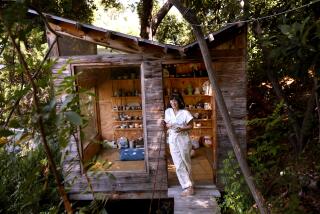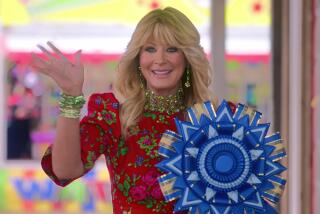Sara Lee to focus on meats and cheesecake, change name
- Share via
It has made Coach handbags, Isotoner gloves, Kiwi shoe polish and Playtex bras. But by Thursday, Sara Lee Corp. will have slimmed down to meat and cheesecake.
What was a $20-billion, multinational holding company with more than 150,000 employees in 2000 will become a food-focused company renamed Hillshire Brands, with about 8,500 employees, a portfolio of meat products and frozen desserts and nearly $4 billion in sales.
The tighter focus is the result of a 12-year process in which Sara Lee has spun off and sold businesses, partly because of investment trends that have dimmed the appeal of diversified conglomerates. But experts also say the Downers Grove, Ill., company never found a solid base business in any particular segment, even though Sara Lee boasted of such marquee names as Coach, Hanes undergarments and its eponymous cheesecakes.
Hillshire Brands’ new chief executive is betting that a simpler mission will improve shareholder returns.
“I’ve long been a believer in the power of a focused company,” said Sean Connolly, CEO of Sara Lee’s North American retail and food-service business. “When you’re focused, you can make sure you’re nurturing your brands and paying attention to consumers. The evidence is clear that big, unfocused companies don’t deliver.”
Sara Lee will complete the spinoff of its remaining international coffee and tea business Thursday, a $3.3-billion company now called DE Master Blenders 1753 and based in the Netherlands.
Hillshire Brands will begin trading on the New York Stock Exchange under the ticker HSH. About 85% of its sales will come from meat products such as Jimmy Dean, Hillshire Farm and Ball Park. About 15% of its sales will be composed of the frozen desserts, including the cheesecake Midwesterners long have wistfully associated with the Standard & Poor’s 500 company.
Connolly came to Sara Lee in January after a decade at Campbell Soup Co., where he helped build the Camden, N.J., company’s V8 business by reframing it as a fruit and vegetable drink and an easy vehicle for nutrients.
He plans something similar at Hillshire: to extend its biggest brands beyond sausage and hot dogs and into new supermarket aisles and categories. As an example, Connolly pointed to the frozen breakfast sandwiches, quesadillas and casseroles that have become an important part of the Jimmy Dean business over the last decade. These products have higher margins and took the well-known sausage brand into the freezer aisle.
New products will be key to Hillshire’s growth, he said.
Hillshire also is looking to grow sales among certain consumers, such as Latino families and calorie-conscious women.
Established in Baltimore as a sugar, coffee and tea business in 1939, the company moved to Chicago in 1942 and changed its name to Sprague Warner-Kenny Corp., going public in 1946.
The company nabbed Kitchens of Sara Lee in 1956 as part of an acquisition of Piggly Wiggly supermarkets. Hillshire Farm, Hanes and Chef Pierre, a maker of frozen prepared desserts, and others were purchased in the 1970s.
James Schrager, a clinical professor of entrepreneurship and strategic management at the University of Chicago’s Booth School of Business, said, “it became very, very profitable to be in a conglomerate and the stock market welcomed and rewarded executives who went out and bought other companies.”
However, “by the mid-’80s everyone figured out it was a temporary gain,” he said. “In fact, it’s much harder to manage a company than it seems when they’re just buying a good brand when you don’t know what’s going on inside them.” But Sara Lee kept buying.
Brands such as Jimmy Dean, Kiwi shoe polish, and Champion sportswear joined the portfolio in the 1980s. Sara Lee Corp. became the company’s official name in 1985.
Sara Lee bought Playtex in the 1990s, along with other apparel, meat and coffee brands, reaching the $20-billion sales mark in 1998. Then growth plateaued. Sara Lee began scaling back in 2000, spinning off Coach and selling other businesses.
After years of lackluster earnings, Sara Lee announced plans to spin off or sell 40% of its businesses in 2005, including its apparel division led by Hanes, European packaged meats and U.S. retail coffee. PepsiCo Inc. alum Brenda Barnes was named CEO and credited with accelerating the company’s divestitures.
“They’ve tried to say for years now, ‘We’ve gotten to a manageable collection of businesses,’” said Tim Calkins, a clinical professor of marketing at Northwestern University’s Kellogg School of Management. “Then a few years later they would say, ‘Now we’ve gotten to a manageable collection of businesses,’ but each time the company really struggled and ended up splitting up some more.”
After the split, the question for a number of industry analysts is whether a smaller company can stay independent, or if it’s likely to be absorbed by a larger one.
More to Read
Inside the business of entertainment
The Wide Shot brings you news, analysis and insights on everything from streaming wars to production — and what it all means for the future.
You may occasionally receive promotional content from the Los Angeles Times.










